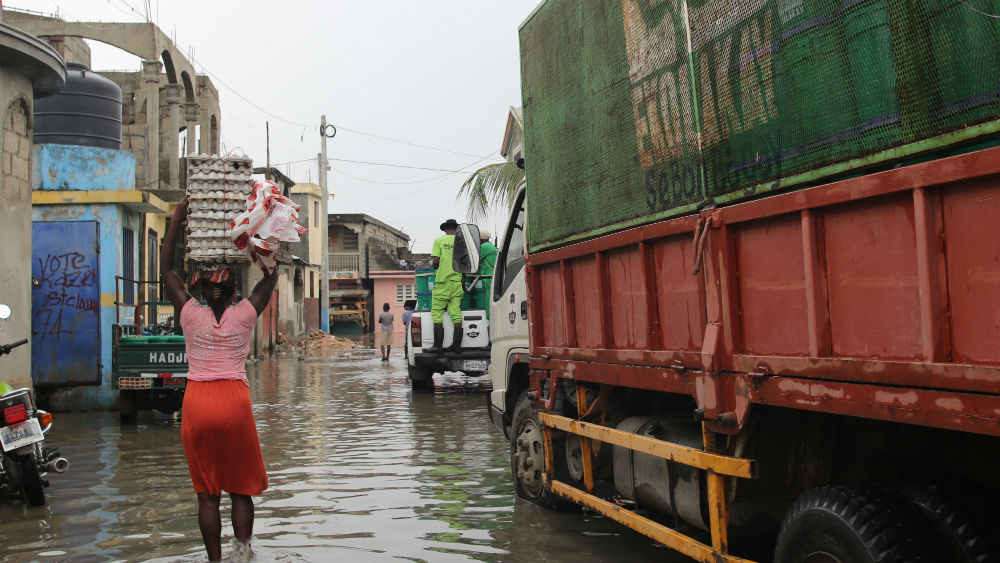When it comes to environmental activism, a lot of the conversation centers vegan diets, paper straws and electric cars as solutions to climate change, land degradation and the increasing rate of natural disasters. Discussions about climate change rarely ever address colonization, white supremacy and the historical destruction of Black and Indigenous lands, as a result of monocropping and plantation-based agriculture. The results of these can be seen most clearly in Haiti, where the soil erosion and deforestation have led to soil depletion.
SOIL Haiti is a nonprofit organization that works to combat the impact of environmental racism as a community vulnerable to climate change. Their mission is to "promote dignity, health, and sustainable livelihoods through the transformation of wastes into resources."
According to Natalie Miller, deputy development director of SOIL, the organization is currently on track to provide 50,000 people in Haiti with sustainable, earth-restoring sanitation by 2025 while transforming a public health crisis into an environmental solution. Its international staff is committed to cultural unification; meaning that they live in Haiti and speak Haitian Creole. Their climate-positive work is sourcing local solutions led by local expertise, with 90% of SOIL’s staff members being Haitian people of African and Indigenous descent.
We spoke with Beverly Pierre, director of the EkoLakay Program at SOIL in Port-Au-Prince, Haiti, about the impacts of environmental racism, climate change and public health. Pierre began her work with the organization in 2018, and has dedicated her life to speaking out about the importance of understanding the relationship between climate change, land degradation and waste management.
Blavity: Why did you decide to join SOIL? Why is this work important for you?
Beverly Pierre: I saw that SOIL was working to have an impact on public health and the environment. Those two things are important and closely related to each other. They cannot be effective without one another. This will help create a positive impact on the soil and also help us in the production of food. This will also be used as a solution to fight against climate change. As you all know, climate change is one of the issues that all countries on the planet are facing right now.
Blavity: I want to talk about the history of European colonization and racism that led to the depletion of Haitian soil to begin with. Is this something your team is conscious of? How is your team working to combat this?
Pierre: The monocropping system from colonialism had a negative impact on Haitian soil. Because of [colonialism] that was happening here in the past, Haiti is one of the most vulnerable countries fighting against the change in the climate. We are more vulnerable because of the soil characteristics but also because of the weather, based on our geographical coordination.
It’s not only because we are part of the Caribbean, but also because we’ve been using chemical products such as fertilizer that has made the soil more vulnerable. Cultivators and rural farmers are using the chemical fertilizer they found in the market. The businessmen are responsible for introducing the chemicals to Haiti. Some of them are Haitian and some of them just have their business in Haiti, but are foreigners.
SOIL is working hard to face this problem and bring a solution. We have been receiving positive feedback that the compost is helping the soil with crop production. Our compost is very helpful for any of the plant species; it gives the adequate nutrients for the growth.
Blavity: Does SOIL have [its own] farms or plant species that you grow yourselves?
Pierre: We mainly produce the compost but we do have some experimental gardens that we use in order to observe the production and the effects of our products. We have crops [such as] plantains, spinach and corn.
Blavity: What can organizations and individuals do to help grassroots organizers in Haiti like yourself?
Pierre: Individuals and organizations can see that what we’re doing in SOIL is positively impacting the environment in Haiti. Everybody who is supporting SOIL in its mission will help improve public health in Haiti. It will help to transform the health crisis into a positive effect on nature. One of the ways they can help is financially: They can visit our website www.oursoil.org
SOIL Haiti exemplifies true sustainability and activism. At the intersections of public health, sanitation, and environmental activism, the organization is actively working to combat soil erosion and land degradation that has disturbed Haitian soil as a result of colonization, harsh farming practices and harmful chemical fertilizers. SOIL Haiti inspires a new understanding of what it means to be environmentally conscious: To be knowledgeable of the social, economic and historical factors that have made certain nations more vulnerable to the effects of climate change than others.
***Publisher’s Note: The interview has been translated from Haitian Creole to English with the help of Randy Claude.
